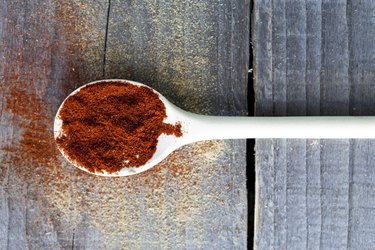
While cayenne is familiar to many as a seasoning for foods, this long, red pepper is also known for its medicinal properties. Used either fresh or dried, the spicy-tasting vegetable adds heat to foods and has been used traditionally to help with digestive and circulatory problems. Though the University of Maryland Medical Center states that cayenne is safe to eat, the pepper may cause digestive irritation if you eat too much.
Cayenne, Capsaicin and Reactions
Video of the Day
Cayenne contains capsaicin, which is the chemical compound that gives hot peppers like cayenne their heat. Too much capsaicin in food can lead to general symptoms of irritation in the mouth, stomach and intestines, and in some cases, it can cause vomiting or diarrhea. Capsaicin is present in both fresh and dried cayenne, as well as in cayenne powder.
Video of the Day
Ways to Reduce Irritation
If you enjoy the flavor of cayenne in your food or your doctor has advised you to take it as a supplement, consume the cayenne as part of a meal or just before a meal to reduce stomach irritation. Because capsaicin does not enter the body through your skin, it will linger on your fingers after preparing cayenne peppers. Take care not to touch your eyes, skin or open wounds if you've been handling cayenne -- dried or fresh -- with your bare hands.
Heartburn Risks
Cayenne pepper in even small amounts, but especially in high quantities, can cause heartburn. The capsaicin content in cayenne irritates the stomach and esophagus lining, increasing the amount of stomach acid produced, which can flow upward into the esophagus, creating a burning sensation in your upper abdomen. A 2010 publication of "Revista de Gastroenterologia de Mexico" found that capsaicin caused gastrointestinal reflux symptoms in people suffering regularly from heartburn as well as those who normally do not experience any reflux problems.
Complications With Medicine
Capsaicin can interact with certain medications, so if you are considering taking cayenne supplements or increasing your cayenne consumption, speak with a medical professional before doing so. In addition to affecting aspirin and blood-thinning medications, cayenne may also affect medication to reduce stomach acid content, including those that help treat symptoms of heartburn. If you are taking blood thinners, diabetes medication or medication for high blood pressure, speak with a doctor before increasing your cayenne intake.
- University of Maryland Medical Center: Cayenne
- National Pesticide Information Center: Capsaicin
- New York University Langone Medical Center: Cayenne
- Revista de Gastroenterologia de Mexico: Capsaicin Induction of Esophageal Symptoms in Different Phenotypes of Gastroesophageal Reflux Disease
- MedlinePlus: GERD